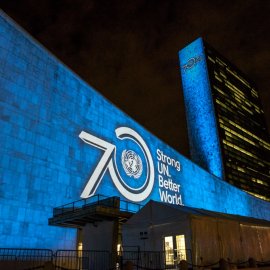United Nations and the Ocean
-
English
-
ListenPause
WOR 414 The United Nations and the Ocean I’m Peter Neill, Director of the World Ocean Observatory. The ocean covers about 70 % of the earth’s surface, the land mass divided into multiple social units that contain burgeoning population, extraction and use of myriad natural resources, and serve as an ever-shifting arrangement of community, cooperation and conflict. There are 196 nations on earth today; the United States recognizes 195 and the United Nations counts 193 as its members. Of the total, 47 nations are land-locked, have no access to the ocean. The other 149 have watersheds and rivers that reach the sea, coastal communities and port cities that typically host larger populations engaged in enterprise and trade. Thus the ocean has an enormous implication for a vast percentage of earth’s inhabitants and exists by virtue of global connection as an equally vast commons that cannot be individually exploited or easily governed by any single nation state. The United Nations serves as a forum for communication and resolution of issues that confront all nations in the form of treaty agreements, regulatory standards, social and political goals and objectives designed to maintain parity and justice and to promote equity and peace. Representatives from all nations gather to discuss and negotiate, to agree and disagree, come to conclusions and arrangement that contribute to the maintenance of international order for the benefit of all mankind. It would seem that oceans would be an essential part of that focus. That assumption has taken some time to realize. In early drafts of assessment reports from the UN Intergovermental Panel on Climate Change, the ocean was hardly mentioned at all. But things have changed for the better and many UN agencies have expanded their ocean agenda to include new ocean issues in comprehensive reports and plans such as the Sustainable Development and Consumption Goals, a First World Ocean Assessment, Tourism and Biodiversity, Marine Plastic Debris, the International Seabed Authority, Food Security and Aquaculture, International Maritime Safety, Climate Change, and the Law of the Sea. All of these subjects will be addressed in a forthcoming meeting of the International Parliamentarian Union, “A WORLD OF BLUE: Preserving the Ocean, Safeguarding the Planet, and Ensuring Human Well-Being In the Context of the UN Sustainability Goals for 2030,” wherein some 300 legislators from countries with ocean issues who will meet at the General Assembly in New York for two days of panel presentations and workshops, moderated by the World Ocean Observatory, to familiarize these representatives with ocean issues and to organize observations and suggestions to be presented as a final report to the General Assembly at “The Ocean Conference” at the UN Headquarters in June. The purpose of this larger meeting is to be “the game changer” that will reverse the decline in the health of our ocean for people, planet and prosperity. It will be solutions-focused with engagement from all as a means to support the implementation of Goal 14 of the UN 2030 Agenda “to conserve and sustainably use the oceans, seas and marine resources for sustainable development. The event will culminate with UN “World Ocean Day” celebration on June 8 when organizations and civic groups gather worldwide to focus on the sustainable ocean through educational events, festivals, beach cleanups, and other activities to build public awareness and engagement with the urgent need to understand and preserve the ocean for the benefit of all mankind. This schedule and language may appear complicated and careful, and indeed it is, but this is the pace of deliberation and consensus that lies at the core of the United Nations process of balancing and reconciling the myriad interests of the 193 members whose ultimate consensus will enable change and success for the sustainable ocean. We will discuss these issues, and more, in future editions of World Ocean Radio. - - - WORLD OCEAN RADIO IS A PROJECT OF THE WORLD OCEAN OBSERVATORY IN ASSOCIATION WITH WERU-FM, BLUE HILL, MAINE. WORLD OCEAN RADIO IS DISTRIBUTED BY THE PUBLIC RADIO EXCHANGE AND THE PACIFICA NETWORK. FIND OUR PODCAST ON ITUNES AND AT WORLD OCEAN OBSERVATORY DOT ORG.
On February 13th and 14th Peter Neill, director of the World Ocean Observatory, will be in New York City to moderate a United Nations Inter-Parliamentary hearing entitled “A WORLD OF BLUE: Preserving the Ocean, Safeguarding the Planet, and Ensuring Human Well-Being in the Context of the 2030 Agenda.” In this episode of World Ocean Radio Peter describes the work of the UN as a forum for communication and resolution of issues confronting all nations. And he will outline the 2-day hearing at the General Assembly where some 300 legislators will gather to discuss and learn about ocean issues and to organize observations and suggestions to be presented as a final report at The Ocean Conference in June.
About World Ocean Radio
Peter Neill, Director of the World Ocean Observatory and host of World Ocean Radio, provides coverage of a broad spectrum of ocean issues from science and education to advocacy and exemplary projects. World Ocean Radio, a project of the World Ocean Observatory, is a weekly series of five-minute audio essays available for syndicated use at no cost by college and community radio stations worldwide. A selection of episodes is now available in Portuguese, Spanish, French, Swahili, and Mandarin, enabling us to reach 75% of the world's population. For more information, visit WorldOceanObservatory.org/world-ocean-radio-global.
Image Credit
UN Photo/Cia Pak
Resources from this Episode
< WORLD OF BLUE, Feb. 13 & 14, United Nations, New York City, NY
< UN Intergovernmental Panel on Climate Change
< The Ocean Conference, June 5 - 8
< International Seabed Authority
< Law of the Sea
< World Oceans Day, June 8
- Login to post comments



